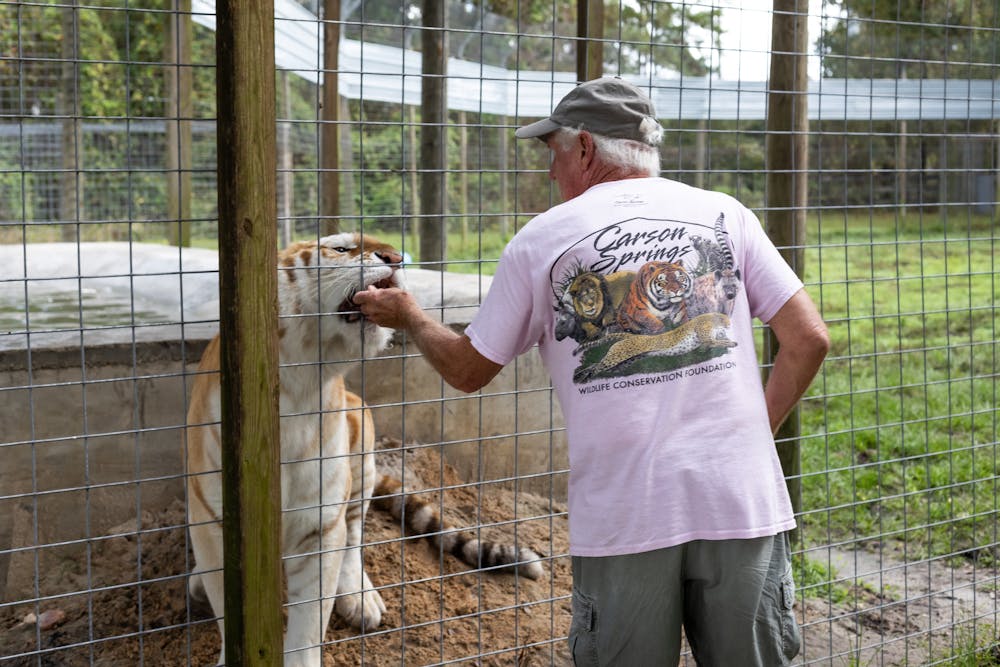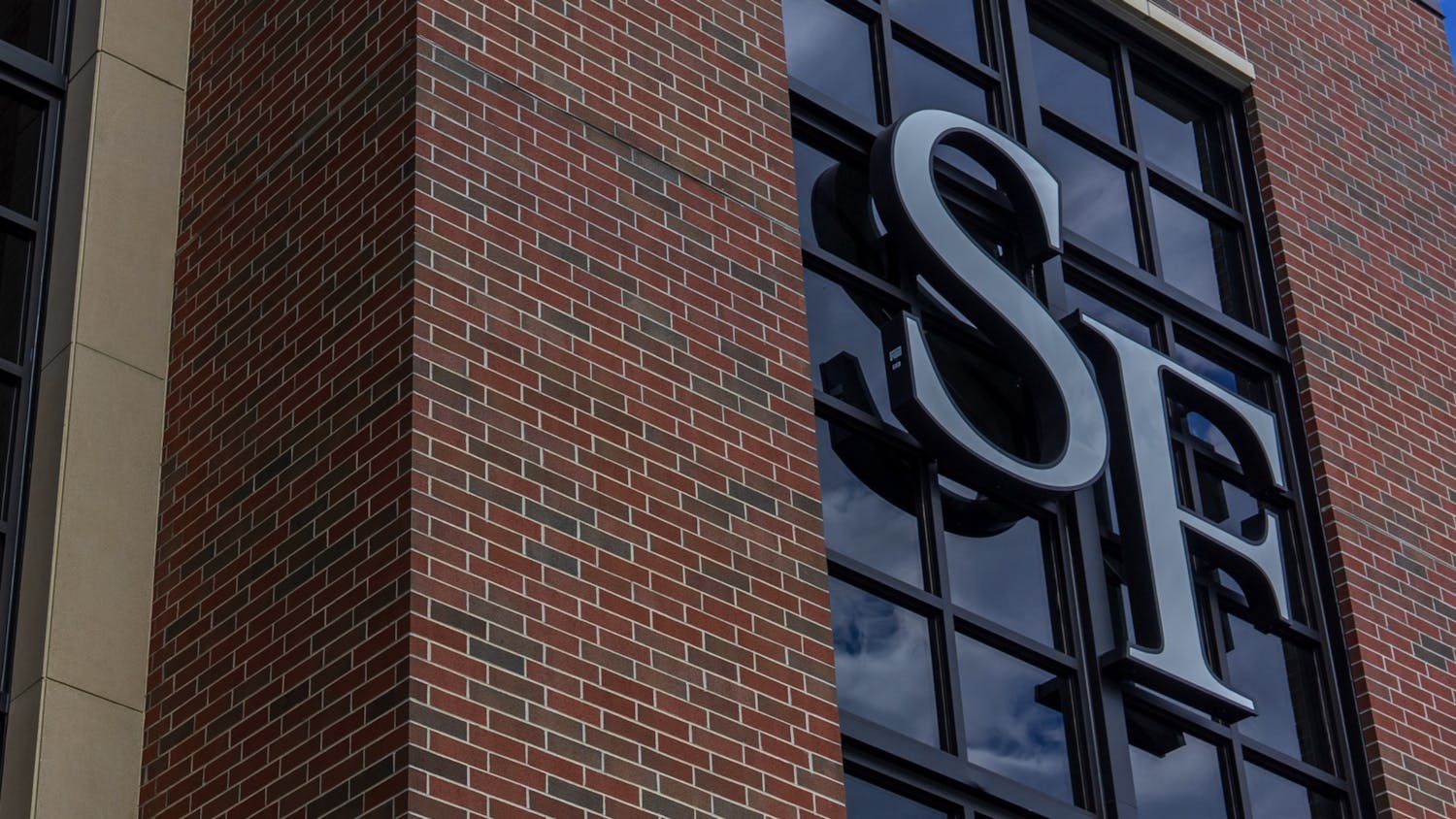A tiger named Gator lies with his face tucked underneath his orange-furred paws. He’s resting on his side, and his nose is pressed against the chain-link fence surrounding his 5 acre enclosure.
Earlier in the morning, he ate his breakfast, and his stomach is now rising and falling rapidly as he takes his mid-morning nap. The distant cries of kookaburras Luke and LuLu sing Gator into a deeper sleep, and the sounds of his next-door neighbor, another tiger named Sunflower, fail to phase him.
His lifestyle is fit for a king — play, eat, nap, repeat. But it wasn’t always like this for Gator.
Just 13 years ago, the concept of being fed was foreign to the tiger. Mia Bryce, a UF master’s student studying wildlife ecology conservation who works at Gator’s sanctuary, said the tiger was rescued from a tiger cub photo facility, where it would often starve its baby tigers for profit.
Before the Big Cat Public Safety Act was signed into law in 2022, staff was required to keep animals under 40 pounds to allow contact with guests. To combat the big cats’ rapid growth, restricting food was common.
By the time Gator was brought to Carson Springs Wildlife Conservation Foundation, he was severely underweight. The foundation searched for veterinarians to work to save the malnourished tiger. Now, he’s the second largest animal at Carson Springs, weighing in at about 500 pounds.
Gator is just one of the many recovery stories housed at the foundation. Carson Springs opened in 2008 and has rescued exotic animals that suffered from mistreatment while providing a home for over 100 others, including 30 endangered species, the foundation’s website said.
The International Union for Conservation of Nature lists over 46,000 species threatened with extinction — that’s 28% of all species that have been assessed. Carson Springs is a nonprofit organization working to combat the increasing risk of extinction by keeping wild species in environments similar to their native habitats.
Barry Janks, the co-founder of Carson Springs, said when he and his wife opened the foundation, it felt like he had found his true purpose in life.
“It’s the most rewarding job building trust with the animals to where we have a mutual bond of love and trust,” he said. “Every one of them is my family, and visitors remark on how special that is.”
To keep conditions as natural as possible for the animals, the foundation only offers guided tours for a two-hour window every week. Bryce said that with no humans running around and disturbing the residents of Carson Springs, the animals are able to exhibit their natural behaviors.
“This is the perfect balance of being in captivity but also still being very natural,” she said. “These enclosures – they’re in all day. They don’t get moved inside at nighttime, so they get to see the stars. They get to see the rain. They get to see all the birds running around. They get to experience things that they could also experience in the wild.”
Returning animals to their natural state is one of the foundation’s priorities. The back of Carson Springs, where the sky is barely visible through the abundance of trees, is one of the original areas where the foundation was built. Other than Tank and Tabitha, two tigers rooming together in their enclosure, most of the animals in this area were surrendered pets. Some were declawed, while others came in wearing diapers after a poor attempt at domestication.
After years of specialized care from staff and Carson Springs founders Barry and Christine Janks, the animals reverted to their innate tendencies, Bryce said. Gator’s neighbor Sunflower, who previously roamed the elevated wooden platform in her enclosure looking for treats, now spends her afternoon prowling the perimeter of her home, often sticking her nose through the gaps in the wired fence when a human approaches.
Bryce said one of the ways Carson Springs keeps its animals happy and healthy is through their diets, ensuring they receive high-quality food. For lemurs, that often looks like a bowl of fruit salad to keep them full.
“I like to praise our diets here,” Bryce said. “We actually don’t even have an on-site vet. We’re really proud that no one ever gets sick because our diets are so good.”
As soon as guests drive through the metal gates protecting Carson Springs’ entrance, they enter a world that contrasts with the rest of Gainesville. On all 245 acres of land, a single piece of concrete cannot be found. The unpaved roads are adorned with gravel, and stray leaves fall from the plethora of trees, providing a slight but welcome challenge to employees relying on golf carts to make their way across the grounds.
Tucked away into Gainesville’s greenery, the reverberations of cars traveling 55 mph down County Road 225 are nonexistent. Instead, the sounds of wildlife fill the air. Standing outside of “lemur town,” the area housing three different species of vocal lemurs, the roars of Lea the lioness echo from hundreds of feet away. Across the path, spotted hyenas Huey and Jess jump into their enclosure’s pool, occasionally pausing their splashing to look at the lemurs, tilting their heads to the side out of curiosity.
There are no sounds of children screaming as they outrun their parents, no music playing through strategically placed speakers. It’s unlike the typical zoos families are used to. Here, the imitation of wildlife is no happy coincidence.
At Carson Springs, it’s more than just looking at cute animals. Each animal’s story is told to every guest who steps onto the property, Bryce said.
“The wonderful animals of Carson Springs feed my soul,” said Carson Springs co-founder Christine Janks. “It is truly a magical place and my heaven. On the hardest day, it is still an indescribable privilege to spend time caring for these animals and seeing the joy they also bring to visitors. I have dedicated my life to animals, and they have given me love, peace and joy in return.”
Contact Tanya Fedak at tfedak@alligator.org. Follow her on Twitter @ttanyafedak.
Tanya Fedak is the Spring 2025 Avenue editor and third-year journalism major. You might also recognize her from WUFT, where she's an anchor and reporter. When she's not on the clock, you can find her rereading "Me Before You" or planning her next trip to NYC.






